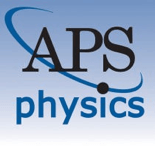
PHYSICAL REVIEW A
Scope & Guideline
Elevating Understanding of Quantum Phenomena
Introduction
Aims and Scopes
- Quantum Mechanics and Foundations:
Research exploring the foundations of quantum mechanics, including quantum interpretation, measurement theory, and contextuality. - Atomic and Molecular Physics:
Studies focused on the properties and interactions of atoms and molecules, including spectroscopy, collision processes, and chemical reactions. - Quantum Information and Computation:
Investigations into quantum computing, quantum algorithms, quantum cryptography, and the theory of quantum information. - Optical Physics:
Research on the interaction of light with matter, including nonlinear optics, quantum optics, and photonic devices. - Condensed Matter Physics:
Exploration of many-body systems, phase transitions, and collective phenomena in condensed matter, with applications in quantum gases and superconductors. - Quantum Dynamics and Thermodynamics:
Studies on the dynamics of quantum systems, including non-Markovian processes, thermodynamic cycles, and quantum engines. - Quantum Control and Measurement:
Techniques and methods for controlling quantum systems and measuring their properties, including error correction and feedback mechanisms. - Topological Phases and Quantum Materials:
Research on topological phases of matter, including Weyl semimetals, topological insulators, and their implications for quantum transport.
Trending and Emerging
- Quantum Technology and Applications:
There is a rising focus on the practical applications of quantum mechanics, including quantum computing, quantum communication, and quantum sensing technologies. - Non-Hermitian Physics:
Research into non-Hermitian systems, particularly in the context of topological phases and exceptional points, is rapidly gaining attention. - Machine Learning in Quantum Physics:
The integration of machine learning techniques into quantum physics research is increasingly prevalent, with applications in quantum state preparation, optimization, and simulation. - Quantum Thermodynamics:
Emerging studies on the thermodynamic properties of quantum systems, exploring the interplay between quantum mechanics and thermodynamic principles. - Entanglement and Quantum Correlations:
There is an increasing emphasis on the study of entanglement, nonlocality, and quantum correlations, particularly in multipartite and high-dimensional systems. - Quantum Optomechanics:
Research involving the interaction between light and mechanical systems at the quantum level is on the rise, focusing on applications in precision measurement and quantum information. - Higher-Order Harmonic Generation:
Studies on high-order harmonic generation processes, especially in complex systems and novel materials, are becoming more prominent. - Quantum Simulation of Complex Systems:
The application of quantum simulation techniques to study complex many-body systems and phenomena that are difficult to address classically is emerging as a key area of interest.
Declining or Waning
- Classical Physics Applications:
Topics that intersect with classical physics, such as classical optics and traditional mechanics, have become less frequent as the focus shifts toward quantum phenomena. - Simple Atomic Models:
Research based on simplistic atomic models has waned, giving way to more complex and realistic models that account for many-body interactions and quantum correlations. - Non-Quantum Mechanical Approaches:
Studies employing methods that are not explicitly quantum mechanical have seen a decline, as the field increasingly prioritizes quantum approaches to explain phenomena. - Basic Theoretical Frameworks:
The publication of basic theoretical frameworks without significant advancements or applications has decreased, as the journal emphasizes innovative and applicable research.
Similar Journals

Science China-Physics Mechanics & Astronomy
Exploring the Frontiers of Mechanics and AstronomyScience China-Physics Mechanics & Astronomy, published by SCIENCE PRESS, stands as a prestigious journal within the Physics and Astronomy domain, particularly recognized for its contributions to the understanding of fundamental and applied physics. With an exhilarating Q1 ranking in the 2023 category and earning a remarkable scopus rank of #21 out of 243, the journal demonstrates its significant impact, being positioned in the 91st percentile of its field. Operating under an Open Access model, it facilitates the broad dissemination of high-quality research, ensuring accessibility for researchers, professionals, and students worldwide. Its scope covers a variety of essential topics in physics and astronomy, promoting a comprehensive understanding of the latest advancements from 2010 through 2024. The journal is a vital resource for anyone aiming to stay at the forefront of research in these dynamic fields, with its prominent address located in Beijing, China, symbolizing its global influence.

Advanced Quantum Technologies
Pioneering Insights in Quantum Mechanics and TechnologyAdvanced Quantum Technologies is a leading journal published by WILEY, specializing in the rapidly evolving fields of quantum mechanics and technology. With an impact factor reflecting its rigorous peer-review process and high-quality research, this journal aims to disseminate the latest advancements across multiple disciplines, including Computational Theory and Mathematics, Condensed Matter Physics, and Electrical and Electronic Engineering. Since its inception in 2018, it has garnered a prominent reputation, as evidenced by its Q1 ranking in several categories for 2023 and its high percentiles in Scopus rankings, showcasing its significant contributions to the academic community. Researchers and professionals alike will find valuable insights within its pages, promoting innovations that bridge theoretical frameworks and practical applications. Although currently not an Open Access journal, Advanced Quantum Technologies continues to strive for excellence, ensuring that its content is accessible and impactful to those who are shaping the future of quantum technologies.
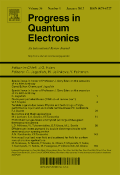
PROGRESS IN QUANTUM ELECTRONICS
Illuminating the Future of Electrical EngineeringPROGRESS IN QUANTUM ELECTRONICS, published by PERGAMON-ELSEVIER SCIENCE LTD, is a premier international journal that serves as a critical forum for the dissemination of high-quality research in the fields of atomic and molecular physics, electrical engineering, and materials science. With its esteemed Q1 category ranking in several disciplines, including Atomic and Molecular Physics, Electrical and Electronic Engineering, and Electronic, Optical and Magnetic Materials, this journal commands a high impact factor and is recognized for its rigorous peer-review process. Established in 1969 and evolving through various phases, the journal currently compiles cutting-edge research that drives advancements in quantum technologies. Researchers, professionals, and students alike are invited to explore a wealth of knowledge and stay updated on pioneering developments in quantum electronics, enhancing their understanding and contributing to the progression of this dynamic field.
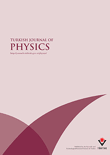
Turkish Journal of Physics
Shaping the future of physics through knowledge sharing.Turkish Journal of Physics, established in 1994 and published by the Tubitak Scientific & Technological Research Council Turkey, is a prominent platform for the dissemination of innovative research in the field of physics and related areas. With an ISSN of 1300-0101 and an E-ISSN of 1303-6122, this journal has carved a niche in the academic community, evidenced by its ranking within the Q3 category in the 2023 evaluation of Physics and Astronomy. As it converges its published works toward the year 2024, researchers and scholars are encouraged to engage with its rich repertoire of studies that covers general physics and astronomy, currently holding a Scopus rank of #96 out of 243, placing it in the top 60th percentile. The Turkish Journal of Physics serves as a vital resource for advancing knowledge, fostering collaborative research, and providing insights into contemporary advancements in the discipline. While it operates under a subscription model, the quality and impact of its peer-reviewed articles make it an essential read for professionals and students alike, looking to stay informed on critical developments within the physics community.

LASER PHYSICS
Advancing Knowledge in Laser TechnologyLASER PHYSICS is a premier academic journal published by IOP Publishing Ltd, dedicated to the exploration and advancement of fundamental and applied research in the fields of Atomic and Molecular Physics, Optics, Condensed Matter Physics, Industrial and Manufacturing Engineering, and Instrumentation. Since its inception in 1996, the journal has been a vital resource for researchers and professionals, contributing significantly to the collective understanding of laser technology and its applications. With a consistent Q3 ranking across several sub-disciplines in the 2023 categories, LASER PHYSICS is recognized for its rigorous peer-reviewed articles that push the boundaries of current knowledge. Although primarily subscription-based, the journal aims to disseminate high-quality research to enhance the scientific community's collaboration. As the journal continues to shape the future of laser science until 2024 and beyond, it stands as an essential platform for both emerging and established scholars seeking to publish innovative findings in this dynamic field.
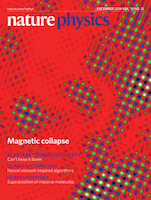
Nature Physics
Elevating Physics Research to New HeightsNature Physics is a premier journal dedicated to publishing high-impact research in the realm of physics, brought to you by the esteemed NATURE PORTFOLIO. With its ISSN 1745-2473 and E-ISSN 1745-2481, this journal has established itself as a vital resource for the physics community, enjoying a remarkable Q1 quartile ranking in the Physics and Astronomy category for 2023 and securing an impressive Rank #5/243 and a 98th percentile ranking in Scopus. Since its inception in 2005, Nature Physics has become a catalyst for innovation, featuring cutting-edge research that encompasses a broad spectrum of physics disciplines. Although it operates under traditional subscription models, it maintains a commitment to accessibility through selective publications and editorial excellence. Positioned in Berlin, Germany, this journal is a must-read for researchers, professionals, and students who seek to stay at the forefront of advancements in physics.

Quantum
Championing collaboration in the world of quantum science.Quantum, an esteemed Open Access journal published by the Verein Förderung Open Access Publizierens Quantenwissenschaft, serves as a pivotal platform for the dissemination of groundbreaking research in the fields of atomic and molecular physics, and optics. Since its inception in 2017, Quantum has emerged as a leader in the academic community, boasting an impressive impact factor within the top quartile (Q1) in its categories, ranking #6 out of 81 in Physics and Astronomy (miscellaneous) and #35 out of 224 in Atomic and Molecular Physics, and Optics in 2023. With its global reach, based in Vienna, Austria, Quantum is dedicated to promoting innovative research and fostering collaboration among scientists, researchers, and students alike. The journal encourages unrestricted access to high-quality publications, ensuring that vital advancements in quantum science are available to all, thereby facilitating knowledge exchange and accelerating scientific progress. Explore the cutting-edge developments at the forefront of quantum studies and contribute to a vibrant scholarly community.

INTERNATIONAL JOURNAL OF THEORETICAL PHYSICS
Exploring the Frontiers of Theoretical PhysicsInternational Journal of Theoretical Physics is a premier academic journal dedicated to the advancement of knowledge in the fields of theoretical physics and mathematics. Published by Springer/Plenum Publishers, this esteemed journal has been a vital platform for researchers since its inception in 1968. With an impressive track record and an emphasis on high-quality, innovative research, the journal currently ranks in the third quartile (Q3) in both the Mathematics (Miscellaneous) and Physics and Astronomy (Miscellaneous) categories as of 2023. While the journal is not open access, it offers accessible subscription options for institutions and individuals. The International Journal of Theoretical Physics serves as an essential resource for scholars and practitioners looking to deepen their understanding and contribute to the evolving landscape of theoretical research, making it a key player in nurturing academic discourse and fostering collaboration in its field.
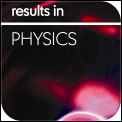
Results in Physics
Fostering Collaboration, Inspiring BreakthroughsResults in Physics, an esteemed open-access journal published by ELSEVIER, has been a prominent platform for disseminating cutting-edge research in the field of physics since its establishment in 2011. With its ISSN 2211-3797 and E-ISSN 2211-3797, this journal proudly holds a Q2 ranking in the Physics and Astronomy category for 2023, showcasing its significance and quality within the scientific community. With a remarkable Scopus rank of #28 out of 243 in the general physics and astronomy domain, placing it within the 88th percentile, Results in Physics serves as a vital resource for researchers, professionals, and students alike, fostering a collaborative environment for the advancement of knowledge across various subfields. The journal aims to provide a rapid and unrestricted access to innovative findings, encouraging open scientific dialogue and enhancing the visibility of breakthrough research. Located in the Netherlands at RADARWEG 29, 1043 NX AMSTERDAM, Results in Physics continues to uphold its commitment to excellence and accessibility in the ever-evolving landscape of physics research.
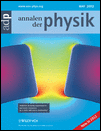
ANNALEN DER PHYSIK
Advancing Knowledge in Physics and BeyondANNALEN DER PHYSIK, a prestigious journal published by WILEY-V C H VERLAG GMBH, stands as a cornerstone of the field of physics and astronomy since its inception in 1799. With an ISSN of 0003-3804 and an E-ISSN of 1521-3889, this journal provides a platform for innovative research and critical discourse across various domains of physics. Annalen der Physik is currently ranked in the Q2 category for general physics and astronomy, occupying rank #76 out of 243 in Scopus, placing it within the 68th percentile. This indicates its significant impact and the quality of research it publishes. Although the journal does not offer Open Access options, its robust historical lineage and ongoing contributions ensure that it continues to be an essential resource for researchers, professionals, and students alike. For those seeking to stay at the forefront of contemporary physics research, ANNALEN DER PHYSIK represents a vital source of knowledge, innovation, and scholarly communication.